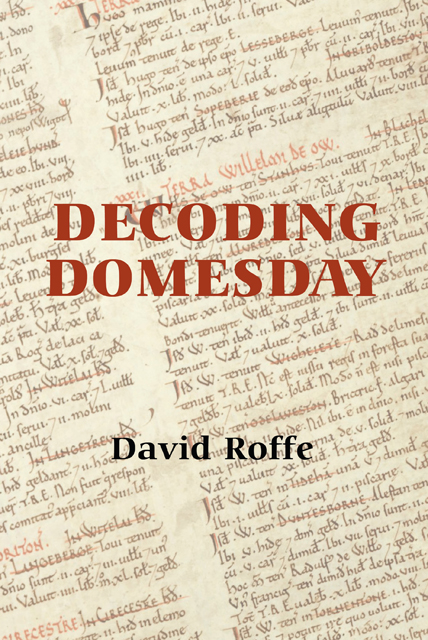Book contents
- Frontmatter
- Contents
- Tables
- Dedication
- Preface
- Acknowledgements
- Abbreviations
- 1 Domesday Past and Present
- 2 The Domesday Texts
- 3 The Inquest and the Book
- 4 The Domesday Boroughs
- 5 Lordship, Land, and Service
- 6 The Vill and Taxation
- 7 The Economy and Society
- 8 The Communities of the Shire
- 9 The Beyond of Domesday
- 10 Domesday Now
- Appendix The main entry forms of GDB
- Bibliography
- Index
8 - The Communities of the Shire
Published online by Cambridge University Press: 10 March 2023
- Frontmatter
- Contents
- Tables
- Dedication
- Preface
- Acknowledgements
- Abbreviations
- 1 Domesday Past and Present
- 2 The Domesday Texts
- 3 The Inquest and the Book
- 4 The Domesday Boroughs
- 5 Lordship, Land, and Service
- 6 The Vill and Taxation
- 7 The Economy and Society
- 8 The Communities of the Shire
- 9 The Beyond of Domesday
- 10 Domesday Now
- Appendix The main entry forms of GDB
- Bibliography
- Index
Summary
It is, of course, a truism to assert that Domesday Book is about lords and manors. The GDB scribe made a half-hearted attempt to enter boroughs as settlements, but otherwise communities hardly get a look-in. However, the same cannot be claimed for the earliest stage of the Domesday inquest. Tenants-in-chief as holders of land were, of course, major participants in the process throughout, but it was local communities – the vill, the hundred, the riding, the shire – that presented and validated the evidence that they provided. In the initial sessions local communities were even its subject. The geld inquest was par excellence about communal affairs. We know from the surviving sources that the matter of who owed what was bound up with the obligations of communities, what was customary and what was not. Much of the data was already written. Routine administrative documents seem to lie behind the earliest Domesday texts. Presentments confirmed and expanded on their data.
The result must have been a comprehensive overview of the obligations of the free communities of the shire. In its turn, the documentation set in train a review. The question of who paid geld was inextricably linked to title in the mind of the free man. It is surely not fanciful to assume that there had been something like a stampede to register liability. Rival claims were inevitable and so the process demanded resolution of claims. Pleas were probably no part of the Domesday inquest. The business of 1086 was too urgent to be held up by messy and protracted private litigation (royal claims may have been another matter). However, such sessions must have been scheduled at an early stage.
The second stage of the Domesday inquest was peripheral to all this furious activity. Schedules of the lands held by each tenant-in-chief were drawn up from the records of the geld inquest and detailed survey was requested in what can only have been a private matter. It was primarily this subset of data that engaged the interest of the compilers of Domesday Book. The communal was largely superfluous to their purpose, and therefore what does survive in the text is largely incidental. It is a fact that often makes the evidence difficult to interpret.
- Type
- Chapter
- Information
- Decoding Domesday , pp. 257 - 279Publisher: Boydell & BrewerPrint publication year: 2015



